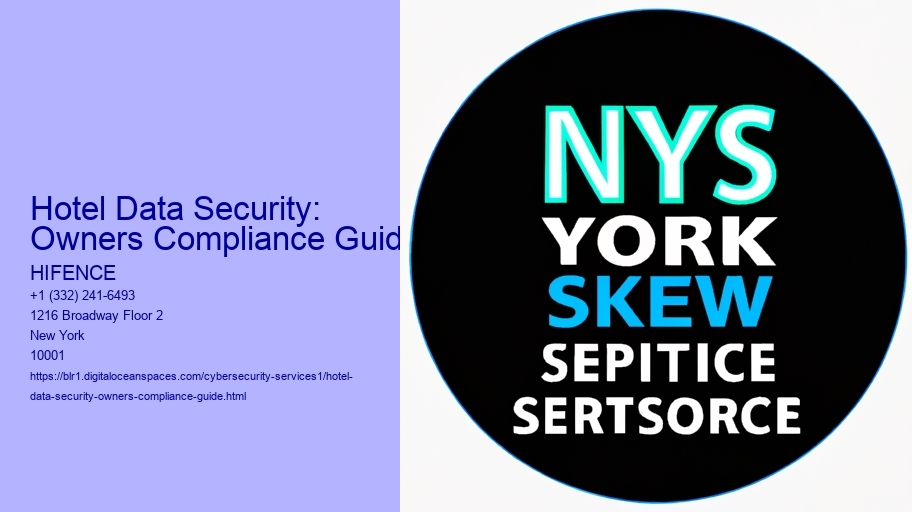Hotel Data Security: An Owners Compliance Guide
Okay, so youre a hotel owner. Congratulations! Youve got a business that thrives on hospitality, comfort, and creating great experiences for your guests. But in todays digital world, theres another crucial aspect to consider: data security.
Hotel Data Security: Owners Compliance Guide - check

This guide is designed to help you understand the essential steps to ensure your hotel is compliant with data security regulations and best practices. Think of it as your roadmap to safer data handling. Its not about becoming a cybersecurity expert overnight, but about understanding the key principles and knowing where to seek help.
First, lets talk about the "why." Why is data security so important for hotels? Well, youre collecting a ton of personal data: names, addresses, credit card details, passport information, loyalty program details, even dietary preferences. This information is incredibly valuable to cybercriminals. A data breach can expose this information, leading to identity theft, financial fraud, and a whole host of other problems for your guests (and a public relations nightmare for you). Beyond the guest impact, youre also holding employee data and proprietary business information. All of this needs safeguarding.

So, what are the key areas of compliance? The first is understanding the regulations. Depending on where your hotel is located and where your guests come from, you might need to comply with regulations like the General Data Protection Regulation (GDPR) in Europe, the California Consumer Privacy Act (CCPA), or Payment Card Industry Data Security Standard (PCI DSS) if you accept credit card payments (and lets face it, who doesnt?).
Hotel Data Security: Owners Compliance Guide - managed it security services provider
- managed it security services provider
- managed it security services provider
- managed it security services provider
- managed it security services provider
- managed it security services provider
- managed it security services provider
- managed it security services provider
- managed it security services provider
- managed it security services provider
- managed it security services provider
- managed it security services provider
- managed it security services provider
- managed it security services provider

Next, you need to assess your current security posture. This means identifying the potential vulnerabilities in your systems and processes. Where is your data stored? How is it accessed? Are your systems adequately protected? A professional security assessment can help you identify weaknesses and prioritize areas for improvement. Think of it as a health check for your IT infrastructure.
Once you know where your vulnerabilities lie, you need to implement security measures to address them. This includes things like:
- Strong Password Policies: (Seriously, "password123" is not a good choice.) Enforce strong, unique passwords for all users and require regular password changes.
- Network Security: Firewalls, intrusion detection systems, and secure Wi-Fi networks are essential for protecting your network from unauthorized access. Segment your network to isolate sensitive data.
- Data Encryption: Encrypt sensitive data both in transit and at rest. This makes it much harder for criminals to access the data even if they manage to breach your systems.
- Employee Training: Your employees are your first line of defense. Train them to recognize phishing scams, handle data securely, and report suspicious activity. (Regular training is key, not just a one-time event.)
- Incident Response Plan: Have a plan in place for how you will respond to a data breach. This should include steps for containing the breach, notifying affected parties, and restoring systems. (Time is of the essence in these situations.)
- Regular Security Updates: Keep your software and systems up to date with the latest security patches. Outdated software is a major vulnerability.
- Vendor Management: If you work with third-party vendors who have access to your data (like reservation systems or payment processors), make sure they have adequate security measures in place. (Due diligence is critical.)
Finally, remember that data security is an ongoing process, not a one-time fix.
Hotel Data Security: Owners Compliance Guide - check
- check
- managed services new york city
- managed it security services provider
- managed services new york city
- managed it security services provider
- managed services new york city
- managed it security services provider
- managed services new york city
- managed it security services provider
In conclusion, as a hotel owner, you have a responsibility to protect your guests and your businesss data.
Hotel Data Security: Owners Compliance Guide - check
- managed it security services provider
- managed service new york
- managed services new york city
- managed it security services provider
- managed service new york
- managed services new york city
- managed it security services provider
- managed service new york
- managed services new york city
- managed it security services provider
